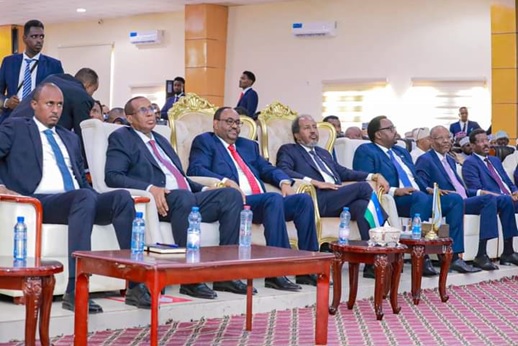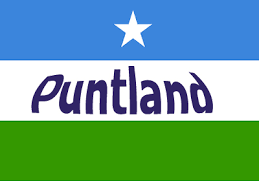By Mohamed Ali (Geelmaal)
The development landscape in Puntland, a semi-autonomous region of Somalia, has been significantly hampered by what many observers describe as deliberate barriers and blockages orchestrated by the federal government under President Hassan Sheikh Mohamud.

This approach, coupled with an indifferent attitude from international donors despite widespread corruption and the politicization of aid, has led to a stark decline in development projects in Puntland compared to the rest of Somalia.
Growing misuse and politicization Aid in Somalia
President Hasan Sheikh Mohamud’s administration has been accused of adopting a deliberate policy to marginalize Puntland, ostensibly to consolidate federal power at the expense of regional autonomy. This approach manifests in several ways:
1) Blocking Key Development Initiatives:
There have been numerous reports of the federal government obstructing key infrastructure projects in Puntland, including road construction, water supply systems, and educational facilities. These blockages have been justified under the guise of “national interest” but are widely seen as politically motivated.
2) Politicization of International Aid:
The federal government has been accused of channeling international aid to regions that are politically aligned with Mogadishu, often at the expense of Puntland. This politicization has led to a disproportionate distribution of resources, further exacerbating regional inequalities.
3) Corruption and Aid Diversion:
Rampant corruption within federal institutions has resulted in the diversion of aid meant for Puntland. Reports indicate that millions of dollars in international donations have been misappropriated or redirected, leaving Puntland’s development projects underfunded or abandoned.
4) Indifferent Attitude of Donors:
Despite clear evidence of these barriers, international donors have largely remained indifferent. The lack of accountability mechanisms and transparency in aid distribution has allowed the federal government to continue its marginalization of Puntland with little to no repercussions.
A Decline in Puntland’s Development Projects
Over the past few years, Puntland has witnessed a dramatic decrease in the number of development projects, both in absolute terms and in comparison to other regions in Somalia. According to recent data:
a) Number of Development Projects:
From 2020 to 2023, Puntland saw a 40% decline in the number of development projects initiated, compared to an average increase of 15% in other regions of Somalia.
b) International Aid Allocation:
Puntland received only 18% of the total international aid directed to Somalia in 2023, down from 28% in 2020, despite being home to roughly 25% of Somalia’s population. (National Bureau of Statistics, 2023.)
This discrepancy highlights the barriers that prevent projects from reaching fruition in Puntland. A case in point is Harfo Galkayo road project funded by African Development Fund. As per the advert of project and related guideline of federal ministry, The SFG insists to micro manage the Project implementation, which is recently advertised in Mogadisho without any role of Puntland authorities in the process.
Ironically Hassan Sheikh is not only hindering the execution of project which is already late, but is using this case to destabilize Puntland by fueling conflict between beneficiary communities and Puntland Administration, creating a perception portraying Puntland as villain.
These underscore a significant disparity that cannot be solely attributed to internal factors within Puntland but also to external pressures and policies that have marginalized the region.
Possible options for Puntland Administration
Puntland continues to be a victim of its relative progress in governance and economic sectors, despite the exclusion and undermining of its development by Mogadishu. Given these obvious challenges, Puntland is now compelled to come up alternatives for dealing with the mounting sabotage of Hassan Sheikh and sustain gains of its development. Off most important is adopting a multi-faceted strategy to counteract the federal government’s obstructionist policies and to advocate for fair treatment in the allocation of development resources. Some of critical interventions in relation to immediate mitigation strategy include among others;
1) Diplomatic Engagement:
Puntland’s leadership should engage in diplomatic efforts to raise awareness among international donors about the barriers they face. This can involve direct talks with donor countries, multilateral organizations, and international NGOs to advocate for a more equitable distribution of aid.
2) Leverage the Diaspora:
The Puntland diaspora, which is economically powerful and well-connected, can play a crucial role in advocating for the region. By organizing lobbying efforts in key donor countries, the diaspora can exert pressure on both the federal government and international donors to ensure that Puntland receives its fair share of development resources.
3) Media Campaigns:
Puntland’s government and civil society organizations should launch media campaigns to highlight the discrepancies in development aid distribution. By raising public awareness, they can create a groundswell of support that pressures both the federal government and international donors to address the issue.
4) Legal and Institutional Reforms:
To reduce the impact of federal interference, Puntland should focus on strengthening its own institutions. This includes improving governance, increasing transparency in project management, and ensuring that aid is used effectively and efficiently.
The Indifference of International Donors
Though International Community plays a key role in the recovery and reconstruction of Somalia, they should not be by standers in the political phase that country is facing under the leadership of President Hassan. As a counter part of the international communities, the SFG continually exploits its legal status, coercing international communities towards specific personal and political interest. Such mandated leadership role should never justify the growing mishandling and politicization of international aid, let alone addressing growing corners of aid diversion.
Needless to emphasize, critical role of International donors and its obligation to take a more proactive approach to ensure that their aid fairly and effectively reaches all regions of Somalia.
Key recommendations may include:
Conditional Aid:
Donors should condition their aid on the federal government’s adherence to principles of fairness and transparency in the distribution of resources. Aid should be tied to specific benchmarks, including equitable regional allocation and the completion of projects.
1) Independent Oversight:
Establishing independent oversight mechanisms to monitor the distribution and utilization of aid can help to reduce corruption and ensure that funds are used as intended. This could involve third-party audits, regular reporting, and increased involvement of local stakeholders in project management.
2) Direct Engagement with Regional Governments:
Donors should consider engaging directly with regional governments, including Puntland, to ensure that aid reaches the intended beneficiaries. Bypassing federal intermediaries can help to reduce the politicization of aid and increase its effectiveness.
3) Support for Anti-Corruption Initiatives:
Donors should invest in anti-corruption initiatives within Somalia, including supporting civil society organizations that promote transparency and accountability. By addressing the root causes of aid diversion, donors can help to ensure that their resources are used effectively.
Conclusion
The development challenges facing Puntland are not merely the result of internal shortcomings but are heavily influenced by external factors, particularly the obstructionist policies of the federal government under Hasan Sheikh Mohamud. To address these challenges, Puntland must adopt a strategic approach that leverages diplomatic, diaspora, and media resources while pushing for legal and institutional reforms.
International donors, for their part, must recognize the disparities in aid distribution and take steps to ensure that their contributions are used fairly and effectively across all regions of Somalia. By working together, Puntland and its allies can overcome the barriers to development and achieve sustainable progress for the region.
Mohamed Ali (Geelmaal)
Eemail. Geel114@gmail.com


Leave a Reply